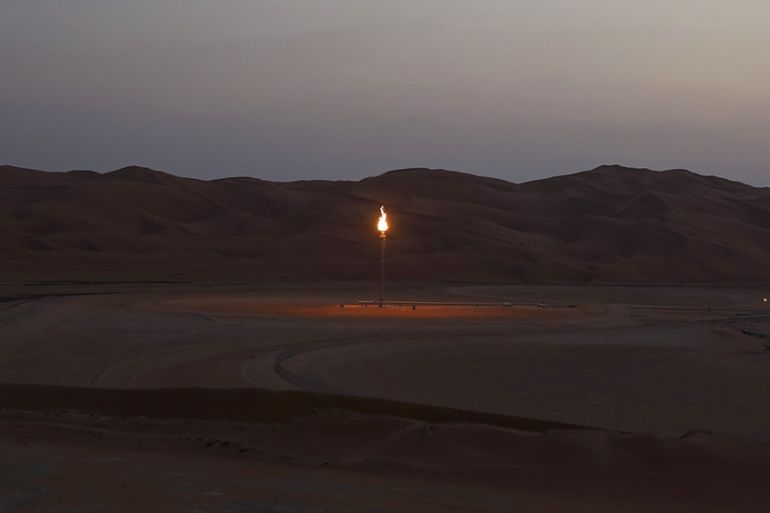Oil gets coronavirus rout reprieve on OPEC official reassurances
Saudi-led OPEC has yet to convince ally Russia to agree to deeper output cuts to counter coronavirus fallout.

Oil eased its downward dive as investors weighed reassurance from OPEC’s top official that the group will stabilize markets with fears that a coronavirus will wreak havoc on economic growth.
Futures recovered about half of their 5.9% slide in New York in a brief reprieve from their sell-off after Secretary-General Mohammad Barkindo said the group and its allies are showing a “renewed commitment” to reaching an agreement next week that will stabilize oil markets. The S&P 500 and Dow Jones Industrial Average indexes pared declines after sinking as much as 10% from all-time highs set this month as the coronavirus spread outside of China.
Keep reading
list of 4 itemsMexico’s teachers seek relief from pandemic-era spike in school robberies
‘A bad chapter’: Tracing the origins of Ecuador’s rise in gang violence
Why is the US economy so resilient?
“The fast-evolving impacts of the virus mean the challenge is akin to catching a falling knife,” Bill Farren-Price, a director at consultant RS Energy Group, now part of Enverus, said in an email. “Agree too-small a cut and risk undermining credibility, or over-tighten the market and boost oil prices just at the time when the global economy is flirting with a downturn.”
Futures eased some losses after dropping below $46 a barrel on Thursday
Oil has fallen more than 22% this year as the virus hit a market already awash with supply. Investors are assessing whether the Organization for Petroleum Exporting Countries and its allies will be able to agree on deeper output cuts at a meeting in Vienna next week. Saudi Arabia is reducing March crude supply to China by 500,000 barrels a day due to lower demand, Reuters reported, citing people familiar.
Oil could fall below $30 a barrel if OPEC+ fails to agree a production cut, Standard Chartered Plc analysts Emily Ashford and Paul Horsnell wrote in a report. Russia has so far resisted pressure from Saudi Arabia for an OPEC+ agreement to cut production further as the virus hits demand.
West Texas Intermediate futures fell 3.1% to $47.21 a barrel as of 1:01 p.m. local time on the New York Mercantile Exchange, while Brent lost 2.5% to $52.12 on ICE Futures Europe.
Though prices have fallen, not all indicators are showing weakness. The April Brent contract, which will expire on Friday, is trading at a premium of about 50 cents to May, indicating supply tightness in the North Sea. That’s despite a nosedive in so-called time-spreads further down the futures curve, with the closely-watched December 2020-2021 differential at the weakest in more than a year on Thursday, highlighting the market’s demand concerns.
Other market drivers
- Gasoline futures fell 3.6% to $1.403.
- The Trump administration is ready to unleash the full impact of sanctions on Chevron Corp.’s operations in Venezuela as the U.S. seeks to further squeeze the Maduro regime.
- Asian petrochemical producers outside of China are starting to feel the effects of the deadly coronavirus, with companies cutting output as stockpiles swell and profits crash due to waning demand.
- Exxon Mobil Corp. posted the second-worst reserves-replacement performance in its history as a crucial measure of future production capacity faltered.
- A tweak to new environmental rules for the shipping industry is just days from taking effect, closing off a loophole for would-be cheats looking to cut their fuel bills.
–With assistance from James Thornhill.